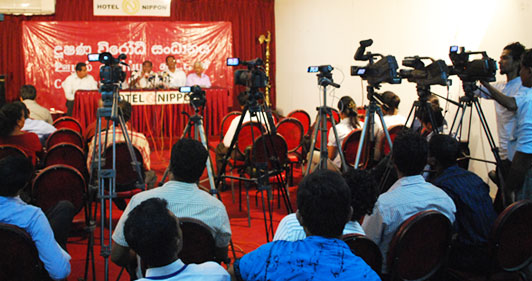The Coalition against Corruption, an affiliate of Transparency International Sri Lanka (TISL), said that the proposed 500 Megawatt coal fired power plant at Sampur will incur a loss of Rs 763 million per year, once commissioned, according to current prices and each consumer would have to pay Rs 1,525 per year to recover the losses.
“We urge the government to forthwith annul the proposed Sampur power project as it is full of corruption and the citizens of this country will have to pay for the sins committed by the authorities,” the Alliance said.
This loss per year would have to be borne by the country, due to the ‘defective Sampur Power Plant Agreement’ between the National Thermal Power Corporation (NTPC) of India and the Ceylon Electricity Board (CEB), the Coalition against Corruption (CAC) charged at a press briefing held on the 14th May 2013.
Addressing the media, CAC Co-Convener, Saman Ratnapriya, alleged that a further electricity tariff hike would be inevitable with the commissioning of the Sampur Coal Power Plant, and revealed that a Cabinet paper had been presented seeking approval for the Treasury to bear the loss amounting to Rs 7,360 million each year. “It is the people’s money that is being spent to offset the losses incurred. We ask the Cabinet not to accept the Cabinet paper submitted in this regard,” he said.
Commenting on the specifics of the Power Purchasing Agreement (PPA) signed between the NTPC and the CEB, with regard to the Sampur project, he said, “It was signed by the CEB Project Director on the directive of the Secretary to the Power and Energy Ministry, M.C.C. Ferdinando, in India. According to the agreement, the efficiency of the Plant has been agreed upon at 33%, while the world accepted standard is 40%. This will incur losses amounting to Rs 2.6 to Rs 4.9 billion for the CEB each year. When the PPA was signed, the total capital required for the project wasn’t mentioned. Therefore, the NTPC, together with CEB officials, will be able to manipulate the capital expenditure at a later time, which would require the CEB itself to purchase power at a greater cost. Inevitably, this would rub off on the consumers in the country.”
Joshep Stalin, a member of the alliance, said that to pave the way for the power plant, the government had rendered over 1,500 families homeless by acquiring 500 acres for the project and number of schools had been closed while places of religious worship had been demolished.
Meanwhile, the Committee on Public Enterprises (COPE) also had found fault with Power and Energy Ministry and CEB officials for misleading them by submitting an erroneous corporate programme for 2009-2013 containing no information about 2013.

